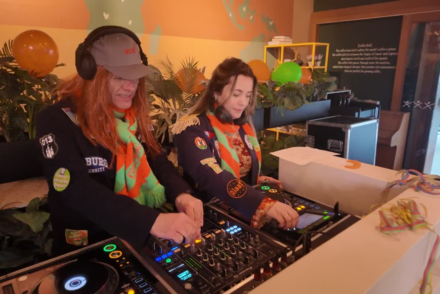Keep talking to Israeli universities: it can increase respect for human rights and peace
The university should not cut ties with Israeli universities, writes associate professor Hans Siebers. He sees more reason to exchange views, students and staff. ‘Reinforcing contacts may favour dialogue, exchange of views and eventually help to increase respect for human rights, justice and peace.’

On May 27, several colleagues published an open letter calling for a suspension of ties with Israeli universities complicit in the genocide against the Palestinian people. I argue this is a very unthoughtful idea that does not answer to the quality standards one may expect from academic analysis and decision-making.
The news about the current atrocities committed by the Israeli armed forces in Gaza and Israeli colonists on the West Bank against Palestinian people is shocking and outrageous. It fits into a pattern of persecution and violence that has been going on against them for decades now. I very much share the acknowledgement of this injustice and outcry against it in the open letter.
However, this is not the whole story. Especially as academics, we cannot be satisfied with responding to this bloodshed only in an emotional and immediate way. It is our task to make such emotions significant in a moral and political way so as to develop approaches and actions that contribute to a solution of the problem instead of making things worse. Emotions may be a good starting point, but they are clearly insufficient in this respect. Here we need facts, analysis and sound argumentation.
First the moral aspect. The facts are these. In the Palestinian-Israeli conflict, there are two groups of victims, i.e. both the Palestinian and Israeli peoples and societies. Both have suffered tremendously since the beginning of the conflict almost a century ago and their sufferings are inextricably interrelated.
Any discussion about each of them separately makes no sense whatsoever. That means that any morally defendable position needs to acknowledge the suffering on both sides. Selective morality is no morality.
That means that any condemnation of the 7 October 2023 massacre can only be credible and acceptable when also condemning the violence and persecution against the Palestinian people. Vice versa, any condemnation of the Gaza genocide can only be credible and acceptable when also acknowledging and rejecting massacres like on 7 October. That brings me to the first critique on the open letter: its one-sidedness and selectivity in the portrayal of the problem. In my view, that is morally unacceptable.
Second, there is the political aspect. Again, the facts. There are two categories of perpetrators in this conflict. On the one hand, there is the Israeli government, and especially the extreme right forces in it, ordering the Israeli army to massacre thousands of people.

There are also the Israeli colonizers on the West Bank, who do not hesitate to kill Palestinians or drive them from their homes and livelihood. On the other hand, we have Hamas, Hezbollah and the Iranian regime.
The degree of cruelty in their actions is unimaginable. They are willing to sacrifice a whole people for their political ambitions. In addition, we need to consider the role of the US government, Russia, Syria, the EU and so on. Any viable political initiative must recognize this complexity.
That means that any action addressing one of these parties, must target the right institutions and actors and must also consider what effects it will have on the agenda of the other. In this case, irrespective of what individual departments may do or not do, as institutions in civil society universities are among the victims of such conflicts. Reinforcing contacts with them may favour dialogue, exchange of views and eventually help to increase respect for human rights, justice and peace.
The fact that not all academic institutions in Israel comply with these standards is no reason to sever ties with them. Quite the opposite, that is an extra reason to exchange views, students and staff with them and rely on the nature of academic work itself.
Not by chance we have our roots as academics in the Enlightenment, something we should cherish and promote instead of cutting off contacts and ties. In that way we may contribute to foster change in the right direction and let the rules and regulations of our profession do their work. A more self-assured position, also towards student activists, would do us no harm, I argue.
Moreover, addressing only Israeli institutions raises the inevitable question what such an action may mean to the other side of perpetrators: Hamas and Iran. It needs no explanation, I suppose, that the actions proposed in the open letter perfectly serve their interests. Iran and Hamas want Israel to be eradicated from the river to the sea and any action to isolate and weaken it brings their strategic objective of antisemitism closer to reality.
We cannot afford the emotional luxury and be naïve in this respect. On the same day as the open letter, the NRC revealed that one of the main organizations behind the international actions of so-called students for an academic boycott, Students for Justice in Palestine (SJP), had hailed and celebrated the Hamas massacre one day after it occurred on 7 October and called for its members to follow the Hamas call for mass mobilization.
I do not see what may be gained by supporting one group of perpetrators against the other. I perfectly understand and support the commitment of some activists with human rights, democracy, rule of law and the protection of life and property. However, if their lack of moral and political analysis leads them to take actions that are welcomed by the current rulers in Teheran, I believe something is going terribly wrong. I do not see any reason why we as academic staff should support them in doing so.
Finally, a more personal touch. Why me writing here? I feel especially touched by this subject because of the fact that in my own field of expertise, i.e. discrimination and exclusion of people with a migration background, we see similar trends. Also here, the suffering of people is manipulated by activists and authors for political and ideological reasons, in this case to support their claims of racism.
They are emotionally touched by such experiences, but refuse to analyse them and fail to develop viable strategies for countering discrimination. Instead, they rephrase them in terms like “institutional racism” that go against the will of the real victims and in the end trigger exactly that which they claim to fight: racism. This is what happens when emotions support ideology instead of analysis and effective strategies to counter real problems of real people.
In short, I have nothing against emotions, but think twice before putting them into action.
Hans Siebers is associate professor at the Department of Culture Studies (TSHD).






